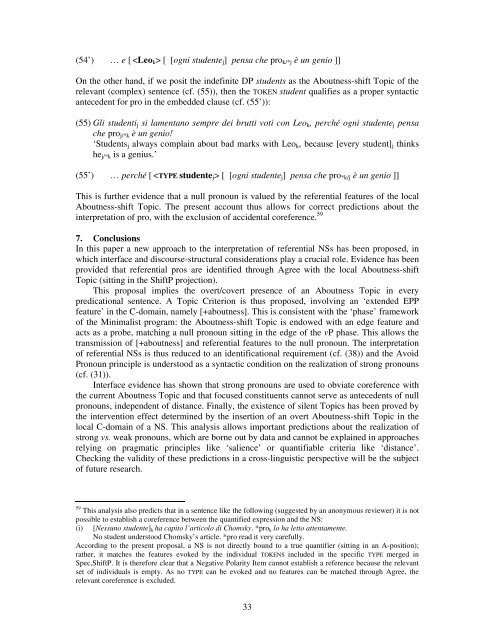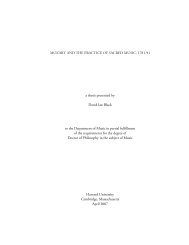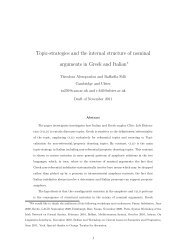Subjects, Topics and the Interpretation of Referential pro.
Subjects, Topics and the Interpretation of Referential pro.
Subjects, Topics and the Interpretation of Referential pro.
Create successful ePaper yourself
Turn your PDF publications into a flip-book with our unique Google optimized e-Paper software.
(54’) … e [ [ [ogni studentej] pensa che <strong>pro</strong>k/*j è un genio ]]<br />
On <strong>the</strong> o<strong>the</strong>r h<strong>and</strong>, if we posit <strong>the</strong> indefinite DP students as <strong>the</strong> Aboutness-shift Topic <strong>of</strong> <strong>the</strong><br />
relevant (complex) sentence (cf. (55)), <strong>the</strong>n <strong>the</strong> TOKEN student qualifies as a <strong>pro</strong>per syntactic<br />
antecedent for <strong>pro</strong> in <strong>the</strong> embedded clause (cf. (55’)):<br />
(55) Gli studentij si lamentano sempre dei brutti voti con Leok, perché ogni studentej pensa<br />
che <strong>pro</strong>j/*k è un genio!<br />
‘Studentsj always complain about bad marks with Leok, because [every student]j thinks<br />
hej/*k is a genius.’<br />
(55’) … perché [ [ [ogni studentej] pensa che <strong>pro</strong>*k/j è un genio ]]<br />
This is fur<strong>the</strong>r evidence that a null <strong>pro</strong>noun is valued by <strong>the</strong> referential features <strong>of</strong> <strong>the</strong> local<br />
Aboutness-shift Topic. The present account thus allows for correct predictions about <strong>the</strong><br />
interpretation <strong>of</strong> <strong>pro</strong>, with <strong>the</strong> exclusion <strong>of</strong> accidental coreference. 59<br />
7. Conclusions<br />
In this paper a new ap<strong>pro</strong>ach to <strong>the</strong> interpretation <strong>of</strong> referential NSs has been <strong>pro</strong>posed, in<br />
which interface <strong>and</strong> discourse-structural considerations play a crucial role. Evidence has been<br />
<strong>pro</strong>vided that referential <strong>pro</strong>s are identified through Agree with <strong>the</strong> local Aboutness-shift<br />
Topic (sitting in <strong>the</strong> ShiftP <strong>pro</strong>jection).<br />
This <strong>pro</strong>posal implies <strong>the</strong> overt/covert presence <strong>of</strong> an Aboutness Topic in every<br />
predicational sentence. A Topic Criterion is thus <strong>pro</strong>posed, involving an ‘extended EPP<br />
feature’ in <strong>the</strong> C-domain, namely [+aboutness]. This is consistent with <strong>the</strong> ‘phase’ framework<br />
<strong>of</strong> <strong>the</strong> Minimalist <strong>pro</strong>gram: <strong>the</strong> Aboutness-shift Topic is endowed with an edge feature <strong>and</strong><br />
acts as a <strong>pro</strong>be, matching a null <strong>pro</strong>noun sitting in <strong>the</strong> edge <strong>of</strong> <strong>the</strong> vP phase. This allows <strong>the</strong><br />
transmission <strong>of</strong> [+aboutness] <strong>and</strong> referential features to <strong>the</strong> null <strong>pro</strong>noun. The interpretation<br />
<strong>of</strong> referential NSs is thus reduced to an identificational requirement (cf. (38)) <strong>and</strong> <strong>the</strong> Avoid<br />
Pronoun principle is understood as a syntactic condition on <strong>the</strong> realization <strong>of</strong> strong <strong>pro</strong>nouns<br />
(cf. (31)).<br />
Interface evidence has shown that strong <strong>pro</strong>nouns are used to obviate coreference with<br />
<strong>the</strong> current Aboutness Topic <strong>and</strong> that focused constituents cannot serve as antecedents <strong>of</strong> null<br />
<strong>pro</strong>nouns, independent <strong>of</strong> distance. Finally, <strong>the</strong> existence <strong>of</strong> silent <strong>Topics</strong> has been <strong>pro</strong>ved by<br />
<strong>the</strong> intervention effect determined by <strong>the</strong> insertion <strong>of</strong> an overt Aboutness-shift Topic in <strong>the</strong><br />
local C-domain <strong>of</strong> a NS. This analysis allows important predictions about <strong>the</strong> realization <strong>of</strong><br />
strong vs. weak <strong>pro</strong>nouns, which are borne out by data <strong>and</strong> cannot be explained in ap<strong>pro</strong>aches<br />
relying on pragmatic principles like ‘salience’ or quantifiable criteria like ‘distance’.<br />
Checking <strong>the</strong> validity <strong>of</strong> <strong>the</strong>se predictions in a cross-linguistic perspective will be <strong>the</strong> subject<br />
<strong>of</strong> future research.<br />
59 This analysis also predicts that in a sentence like <strong>the</strong> following (suggested by an anonymous reviewer) it is not<br />
possible to establish a coreference between <strong>the</strong> quantified expression <strong>and</strong> <strong>the</strong> NS:<br />
(i) [Nessuno studente]k ha capito l’articolo di Chomsky. *<strong>pro</strong>k lo ha letto attentamente.<br />
No student understood Chomsky’s article. *<strong>pro</strong> read it very carefully.<br />
According to <strong>the</strong> present <strong>pro</strong>posal, a NS is not directly bound to a true quantifier (sitting in an A-position);<br />
ra<strong>the</strong>r, it matches <strong>the</strong> features evoked by <strong>the</strong> individual TOKENS included in <strong>the</strong> specific TYPE merged in<br />
Spec,ShiftP. It is <strong>the</strong>refore clear that a Negative Polarity Item cannot establish a reference because <strong>the</strong> relevant<br />
set <strong>of</strong> individuals is empty. As no TYPE can be evoked <strong>and</strong> no features can be matched through Agree, <strong>the</strong><br />
relevant coreference is excluded.<br />
33
















